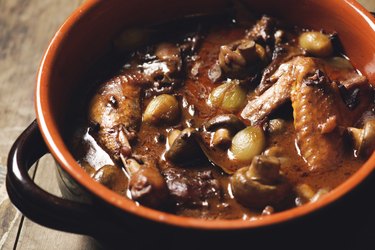
Red wine vinegar is sometimes used in marinades for highly-flavored grilled meats, such as fajitas or shish kabobs, but it makes a poor substitute for red wine to flavor roast beef. Red wine vinegar lacks the depth and sweetness of red wine, and leaves a lingering acidic taste in the mouth.
What is It?
Video of the Day
Both red wine and red wine vinegar are made from red grapes, but red wine vinegar is made from red wine that has been allowed to sour. The sugars in red wine turn to acetic acid, which gives vinegar its characteristic biting flavor.
Video of the Day
Cooking Uses
In general, red wine and red wine vinegar are used very differently in the kitchen. Red wine is often used to add flavor and moisture to braised and stewed meats, such as Beef Burgundy or Coq au Vin, but can also be used to flavor dessert sauces. Select a mid-quality wine for cooking and avoid cooking wines or very expensive bottles. Red vinegar, on the other hand, is usually reserved for uncooked dishes, such as salads and salad dressings. Its tart flavor accentuates mild vegetables, pastas and rice.
Quantities
If the recipe calls for less than 1/4 cup of red wine, you can safely substitute red wine vinegar, although it won't produce the same results. Do not use larger amounts of red wine vinegar, though. The roast will have an unpleasant vinegary taste, rather than the mellow, complex taste of roast beef braised with red wine.
Substitutes
Rather than use red wine vinegar, which may ruin the roast, try non-alcoholic substitutes, such as beef broth, grape juice or cranberry juice. These substitutes will alter the taste slightly, but carry less risk than red wine vinegar. Substitute port for red wine in a pinch.